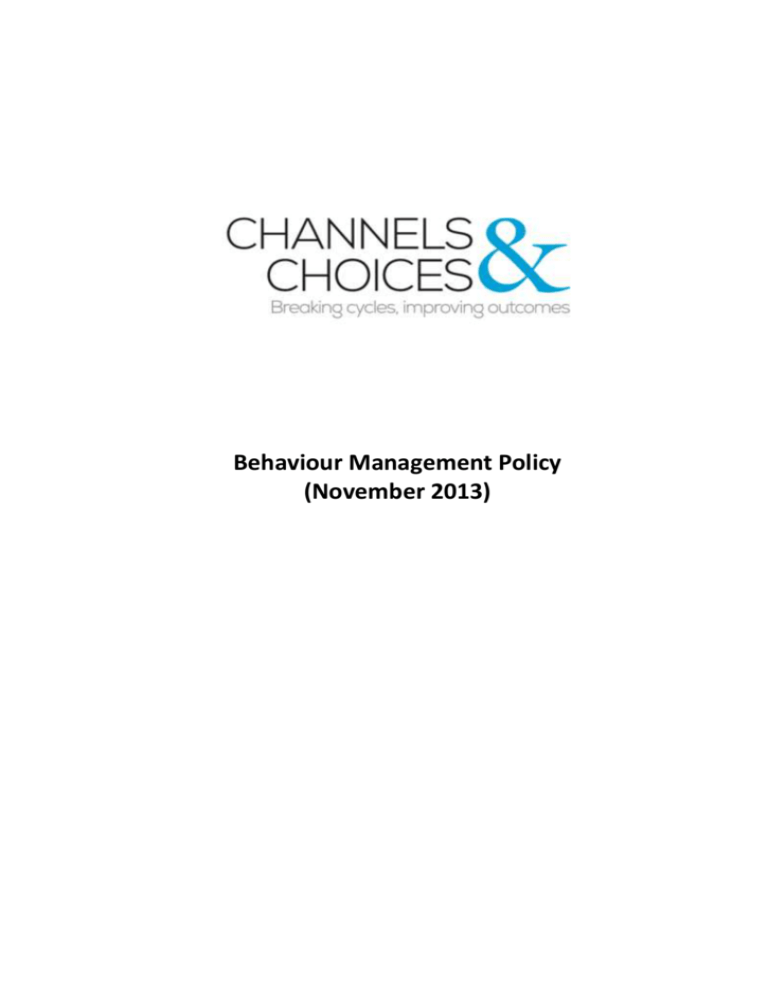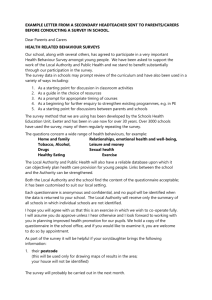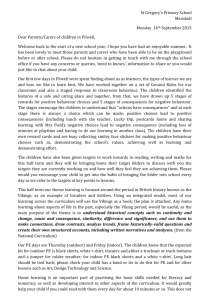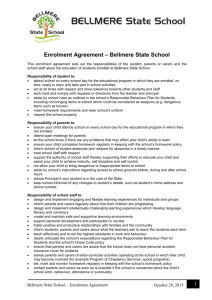Fostering Behaviour Management Policy
advertisement

Behaviour Management Policy (November 2013) This document relates to the Fostering Services (England) Regulations 2011 Regulation 13 and National Minimum Standard 2011 Standard 3 The aim of the policy is to provide a clear and useful policy on behaviour management for foster carers which will ensure a consistent and effective response to children looked after by the organisation. The policy will outline the principles of good practice and effective methods of managing behaviour. The policy aims to equip carers with the skills and awareness they need in order to provide children in their care with a safe, nurturing and encouraging environment that will enable them to reach their full potential and grow into responsible adults. Our principles are:That children and young people should be offered a nurturing environment with firm but fair boundaries. This should enable the child to develop a sense of care, security and personal responsibility that will allow them to become mature, sensible adults. Through the use of effective behaviour management techniques children are able to make choices about and take responsibility for their behaviour in the context of a caring and trusting relationship As all children are unique and have different life experiences there is a need for foster carers to have maximum flexibility in the care they provide. Many children who are fostered have been victims of various forms of abuse and neglect and carers must have regard for these experiences at all times when they are caring for the young person and managing their behaviour. Every child who is looked after has a right to have their needs in terms of gender, religion, ethnic origin, language, culture, disability and sexuality respected. This must be taken into account when exercising behaviour management techniques. For carers looking after children with disabilities there are specific issues regarding managing behaviour. Children’s impairments affect behaviour in different ways, for example, the difficulty in communicating non-verbally can cause frustration which may lead to conflict and challenging behaviour. Relationship Building with Young People Everyone needs to be valued, to feel special, and to feel important. By treating children ‘looked after’ as individuals, working and caring for them, foster carers can build up their self-confidence. By making opportunities for children to succeed foster carers will build up children and young people’s self-esteem. (NMS 2.1 2.2 2.6) In the initial stages of a placement, a positive way of laying the foundation stones for good relationships is by offering a few clear expectations of the young person on which to build. This is particularly relevant in the case of an emergency placement. It is very important for carers to demonstrate in their own day to day actions the type of caring, considerate behaviour they would wish from the young people they look after. It is often of benefit to sit down with children and young people and involve them in drawing up a behaviour management plan. Children and young people often have a view on what sanctions or positive interventions will be effective for them. (NMS 3.2 3.3 3.4) A child or young person's age and level of understanding should be taken into account in deciding the most appropriate ways of handling their behaviour. (NMS 3.4). Behaviour Management Policy November 2013 Page 2 of 8 Foster carers should attempt to impose a sanction which relates to the incident. For example, if a young person returns home later than agreed a sanction which would relate to this would be to not allow them out the following evening or to have an earlier time to come home the next evening. Another example would be if a young person breaks a window by throwing a stone at it the sanction could be to withhold half of their pocket money until the value has been recouped. It is important that foster carers do not ‘over use’ sanctions or put in place sanctions that appear to be punitive or that appear overly harsh. For example, if a child hits out at another child whilst playing in the garden it would appear overly harsh to place a sanction not allowing them to play in the garden again for a week. However, a more measured sanction may be to use a period of ‘time out’ then reintroduce the child back into the garden and encourage them to apologise to the child they hit. (FSR 13 (b)) The following guidance has been written to advise on the behaviour management of children and young people and provides some examples of acceptable sanctions and sanctions which may be used, together with a list of those which are unacceptable and must not be used. (FSR 13 (1)) Acceptable Sanctions Ignoring Behaviour This means a deliberate lack of response to attention seeking behaviour. The decision to ignore is based on the belief that the behaviour will then decrease. This method may or may not be a part of a young person's Placement Plan. It may be alright to ignore "showing off" in the home, whilst it would not be appropriate to ignore the same behaviour in public, when this involves 'showing up' and thus labelling the family in public. Giving Space This is to prevent inappropriate behaviour getting out of hand, either by foster carers withdrawing or allowing the young person to leave the scene. This can allow the young person to reflect, cool down, have private thoughts and adjust their behaviour. This should be recorded and needs to be age appropriate and relating to levels of understanding, e.g. it would be as inadvisable to send a 2 year old to their room out of the foster carers' sight as it may be for a 14 year old with severe learning difficulties. Verbal Reprimand A verbal reprimand, with or without raised voice, must NOT include terms of abuse or be designed to humiliate, oppress or demean. It is an immediate feedback for inappropriate behaviour. It demonstrates disapproval. It is most effective when delivered within the context of a positive relationship, but foster carers should note that it is always preferable to take a young person to one side than to deliver a "public reprimand". Rewards Rewards are such things as outings, activities, goods, money, extended bedtimes, which are given for good behaviour. These are very important in a foster home to help increase a young person's selfesteem. Foster carers need to give particular thought to the type of reward system best suited to their family and the individual child or young person. Incentives Control of behaviour is likely to be effective if the young person can see that they will gain in return for effort. Therefore, foster carers should always consider incentives for the young person and ways in which the period or sanction can be shortened in recognition of appropriate behaviour. How a young person Behaviour Management Policy November 2013 Page 3 of 8 can gain back privileges should be part of the discussions at a young person's planning meeting and recorded. Confiscation Confiscation, temporarily or permanently, of any article, material or substance belonging to the child or young person if it is considered to be a serious nuisance to others or to be dangerous or injurious to others or the young person, is permissible. In all cases the young person must be informed as to if and when the items will be returned and by whom. Return of the item can be either after a specific period of time has elapsed, or where a specified behaviour has ceased, or where ownership has been verified. Withdrawal of Activities Temporary withholding of activities outside the home could be an option as a sanction (e.g. a young person not being allowed to go swimming) but foster carers need to be mindful of the effects this may have on a child or young person’s development. NB - Contact with family must not be withdrawn as a sanction. Suspension of Pocket Money Occasional reduction in pocket money to pay for damages caused by unruly or deliberately destructive behaviour or as a sanction for very serious misconduct, can be used. Any restitution may be in full or in part, but children and young people should never have more than half their pocket money stopped in any one week. This should not be a sanction which is prolonged and used too frequently. Extra Household Chores At the beginning of any placement, young people should be made aware of the expectations on them to carry out household chores (which must be age appropriate). Much research undertaken in this area has shown that a positive way to encourage responsible behaviour is to give children genuinely responsible tasks. This is the reason many parents assign regular chores to their children. Requirements that the child or young person undertakes extra meaningful tasks may also be a useful measure of control. Timescales of quantity of work to be carried out must be specified at the time the sanction is imposed and recorded. Early Bedtime This can be used as a sanction, but never more than one hour earlier than usual bedtime and not more than two consecutive evenings. It is important that the child’s history is considered when using this sanction as it may be inappropriate for some of the children who we care for. Grounding There are many instances where a foster carer would consider grounding (i.e. not allowing young people to leave home unaccompanied) appropriate. Foster carers are advised that if grounding is felt to be an appropriate sanction on a regular basis, they must consult with the young person's social worker and it must be part of a plan. Grounding must not involve the child being prevented from leaving by being locked in or physically restrained. List of Sanctions not to be used Where sanctions are used, these must not include:Corporal Punishment Behaviour Management Policy November 2013 Page 4 of 8 This means the intentional application of force as a sanction and includes biting, pinching, slapping, rough handling, striking with or without an implement or throwing missiles at a young person. (FSR 13 -2 (a)) Deprivation of Food and Drink The deprivation of food and drink normally made available to a young person. Withholding of Medication, Medical or Dental Treatment This is a dangerous and utterly unacceptable practice and is, accordingly, totally forbidden in all circumstances. Prescribed medication must always be given as directed by a medical practitioner. Intentional Deprivation of Sleep Apart from the grave psychological damage deprivation of sleep could inflict it could also seriously affect the physical health of the young person. The use of Disrespectful or Abusive Language This includes the use of verbal or non-verbal forms of abuse designed to oppress, humiliate or demean, i.e. the type of action which might demonstrate no respect and can lead to children feeling worthless. Requiring Young People to Wear Distinctive or Inappropriate Clothing Young people must not be required to wear distinctive or inappropriate clothing as a sanction. This does not mean that young people may not wear Boy Scout or Girl Guide uniforms or other distinctive clothing required by school/hobbies. Restriction or Refusal of Visits/Communications Young people must not be refused visits or communication from their carers, relatives or close family friends as a sanction. However, it is acceptable to restrict such visits/communications as part of a plan to promote the welfare of the young person. This action can only be taken with the written agreement of the young person's social worker. The Use of Accommodation to Physically Restrict the Liberty of Any Young Person The use of any form of accommodation to physically restrict the liberty or otherwise isolate any young person is totally prohibited except in premises approved by the Secretary of State for use as secure accommodation and under criteria set down in S.25 of the Children Act 1989. Intimate Physical Searches Intimate physical searches of children and young people are totally unacceptable. Physical Restraint and Physical Contact Physical restraint should never be used as a form of sanction or as a matter of course and should be avoided wherever possible. (FSR 13-2 (b)) Foster carers, however, have a legal and moral duty to protect young people in their care and to promote their welfare. This means that, in certain situations, physical restraint may have to be used where: there is a clear perceived risk that a young person is likely to harm him/herself or others; or there is a likelihood of serious damage to property and consequent risk to the safety of the young person and others. (FSR 13-2 (c)) Behaviour Management Policy November 2013 Page 5 of 8 Foster carers need to note the following points carefully and ask for clarification if they feel it is necessary. Physical restraint means holding a child or young person in a way which avoids any pain or injury to the young person. This excludes hitting, punching and the use of any instruments, e.g. rope. Physical restraint should only be applied with the minimum force required to ensure the safety of the child or young person or others. Physical restraint should be the last resort. If a foster carer feels it is not possible to restrain a child safely then no further attempt should be made to control him or her without further help. Other children should not be asked to assist in restraining a child. Ideally a second adult should be present whenever possible even when one adult is able to restrain a child or young person safely. Once a child or young person has calmed, allow recovery time and later discuss why the restraint was necessary. Foster carers should report the incident to the organisation as soon as possible including via the ‘Out of Hours’ service and record the incident on an Incident Reporting Form. Foster carers need to be mindful of the fact that any form of restraint is open to question and discretion and they can be challenged on their use of it by the child, the person with parental responsibility and the Local Authority. Therefore, foster carers need to be clear that they strictly observe the above guidelines. Inappropriate use of restraint could lead to the foster carers being considered unsuitable for future placements or, in an extreme case, being charged with assault. Holding A young person may, in some circumstances, be successfully diverted from difficult behaviour by means of an arm around his/her shoulder or being led away by the hand or arm. In this situation holding would discourage the behaviour but would not prevent it and consequently would not constitute restraint. It would be used to reinforce the attempts by carers to reason with the young person or to emphasise concern for them. Physical Affection Foster carers should feel able to express appropriate "physical" affection towards young people in their care. This may involve, for example, a goodnight hug or physical comfort for a young person in distress. Several factors should be considered in establishing acceptable/unacceptable forms of contact: The previous experiences of a young person. This may have involved sexual/physical abuse; The age and gender of the young person; The young person's cultural background; Behaviour Management Policy November 2013 Page 6 of 8 The young person's level of understanding. Foster carers should always be aware of the vulnerability of their position, avoiding any expectation of privacy in expressing physical affection and recognising when it would be inappropriate to respond to a young person seeking physical comfort. Children with Disabilities When considering the control and discipline of children and young people with severe learning difficulties it is necessary to understand the different ways a child may behave as a result of their intellectual and/or multiple disabilities. Epilepsy can, at times, uncontrollably influence behaviour. Temporal Lobe Epilepsy, in particular, may be associated with a display of aggressive and disassociated behaviours. Allergic reactions to certain foods and food additives can trigger hyperactive behaviour. The environment can influence behaviour. Sometimes events that happen before a particular behaviour (antecedent) are important while, on other occasions, the way we respond (consequence) is crucial to how children/young people learn to behave appropriately. Approach - often the way we approach or handle behaviour can be the reason for an improvement or an exacerbation, so close attention must be given to our responses and interventions. The inability to communicate effectively and lack of understanding can sometimes promote significant levels of frustration which may manifest itself in a form of disruptive behaviour. Self-stimulatory behaviour - some children/young people may be prone to head-banging, rocking, eye poking, repeated masturbation and self-mutilation. Training Training on de-escalation and restraint and anti-bullying is part of the organisation’s training programme for foster carers and should form part of their Individual Development Plan. Recording Foster carers should record all sanctions used to manage children and young people’s behaviour on the monthly Foster Carers Child in Placement Summary. Should the sanction involve physical restraint an Incident Reporting Form should be completed immediately this is possible and forwarded on to the Supervising Social Worker or Registered manager . Reporting Events In the event of a breach of this policy it is essential that foster carers notify their Supervising Social Worker or the organisation’s ‘Out of Hours’ service. The purpose of notification is to ensure the support and protection for all parties, including foster carers. Notifiable Events In line with Schedule 6 (8) of the Fostering Service Regulations use of any measures of control, restraint or discipline in respect of children accommodated in a foster home must be monitored by the Registered Manager. This should be evidenced in the Quality Care Review. (FSR 35) Behaviour Management Policy November 2013 Page 7 of 8 Related Policies Anti-bullying Child Protection and Safeguarding Complaints and Concerns on Standards of Care Children Missing from Care Contact Record Keeping Valuing Diversity and Equality Behaviour Management Policy November 2013 Page 8 of 8








